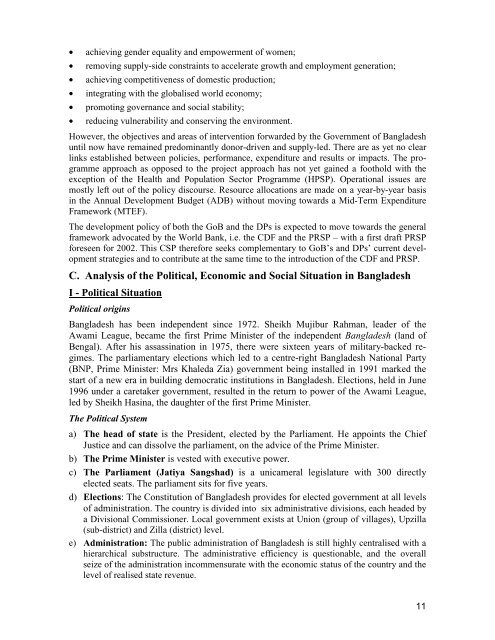EC Country Strategy Paper for Bangladesh 2002-2006
EC Country Strategy Paper for Bangladesh 2002-2006
EC Country Strategy Paper for Bangladesh 2002-2006
You also want an ePaper? Increase the reach of your titles
YUMPU automatically turns print PDFs into web optimized ePapers that Google loves.
• achieving gender equality and empowerment of women;<br />
• removing supply-side constraints to accelerate growth and employment generation;<br />
• achieving competitiveness of domestic production;<br />
• integrating with the globalised world economy;<br />
• promoting governance and social stability;<br />
• reducing vulnerability and conserving the environment.<br />
However, the objectives and areas of intervention <strong>for</strong>warded by the Government of <strong>Bangladesh</strong><br />
until now have remained predominantly donor-driven and supply-led. There are as yet no clear<br />
links established between policies, per<strong>for</strong>mance, expenditure and results or impacts. The programme<br />
approach as opposed to the project approach has not yet gained a foothold with the<br />
exception of the Health and Population Sector Programme (HPSP). Operational issues are<br />
mostly left out of the policy discourse. Resource allocations are made on a year-by-year basis<br />
in the Annual Development Budget (ADB) without moving towards a Mid-Term Expenditure<br />
Framework (MTEF).<br />
The development policy of both the GoB and the DPs is expected to move towards the general<br />
framework advocated by the World Bank, i.e. the CDF and the PRSP – with a first draft PRSP<br />
<strong>for</strong>eseen <strong>for</strong> <strong>2002</strong>. This CSP there<strong>for</strong>e seeks complementary to GoB’s and DPs’ current development<br />
strategies and to contribute at the same time to the introduction of the CDF and PRSP.<br />
C. Analysis of the Political, Economic and Social Situation in <strong>Bangladesh</strong><br />
I - Political Situation<br />
Political origins<br />
<strong>Bangladesh</strong> has been independent since 1972. Sheikh Mujibur Rahman, leader of the<br />
Awami League, became the first Prime Minister of the independent <strong>Bangladesh</strong> (land of<br />
Bengal). After his assassination in 1975, there were sixteen years of military-backed regimes.<br />
The parliamentary elections which led to a centre-right <strong>Bangladesh</strong> National Party<br />
(BNP, Prime Minister: Mrs Khaleda Zia) government being installed in 1991 marked the<br />
start of a new era in building democratic institutions in <strong>Bangladesh</strong>. Elections, held in June<br />
1996 under a caretaker government, resulted in the return to power of the Awami League,<br />
led by Sheikh Hasina, the daughter of the first Prime Minister.<br />
The Political System<br />
a) The head of state is the President, elected by the Parliament. He appoints the Chief<br />
Justice and can dissolve the parliament, on the advice of the Prime Minister.<br />
b) The Prime Minister is vested with executive power.<br />
c) The Parliament (Jatiya Sangshad) is a unicameral legislature with 300 directly<br />
elected seats. The parliament sits <strong>for</strong> five years.<br />
d) Elections: The Constitution of <strong>Bangladesh</strong> provides <strong>for</strong> elected government at all levels<br />
of administration. The country is divided into six administrative divisions, each headed by<br />
a Divisional Commissioner. Local government exists at Union (group of villages), Upzilla<br />
(sub-district) and Zilla (district) level.<br />
e) Administration: The public administration of <strong>Bangladesh</strong> is still highly centralised with a<br />
hierarchical substructure. The administrative efficiency is questionable, and the overall<br />
seize of the administration incommensurate with the economic status of the country and the<br />
level of realised state revenue.<br />
11

















